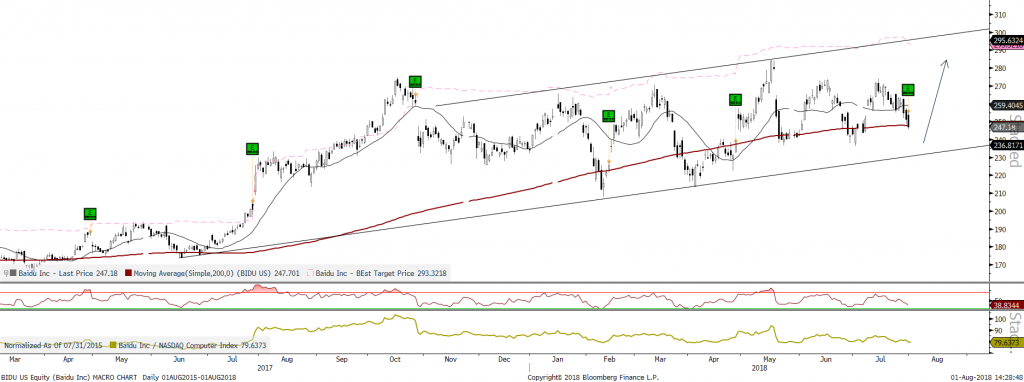Baidu shares turn negative pre-market, giving up an earlier earnings-driven gain, as Google is reported to be pursuing a censored search engine for the China market. Baidu could lose significant search traffic and sales share if Google returns to China in 6-9 months. Google’s engine had 14% of China’s search traffic and 33% of its revenue share in late 2009 prior to its retreat. At the time, Baidu had 79% share of China’s search traffic and accounted for 63% of search-related sales.
Baidu, China’s largest search engine, fell 7 percent in pre-market trading in New York; the stock had climbed as much as 2.2 percent prior to that after the company on Tuesday reported second-quarter revenue and profit per ADR that topped analyst estimates.
While theoretically the successful presence of Google in China could destroy all value for Baidu, we suspect it won’t be that easy, so we want to use that google news to buy this great stock at a strong support arounrd 230, though a long call spread 240 / 260 at 4.4 (if the google story is somehow downplayed, our long term target is 295).

COMPANY THESIS: apart the google story, Baidu is likely to see stable growth from its core online-marketing business, as it utilizes artificial intelligence (AI) and big-data technology to enhance user engagement for its search, news feed and video products, and drive monetization. The company should continue to shed tangential businesses and focus its resources on AI projects that complement its core products. Initial commercialization of its autonomous driving platform Apollo and conversational
AI platform DuerOS should gather pace as more manufacturing partners join these ecosystems, yet its sales contribution should remain immaterial in the medium term. (08/02/18)
For those interested by Google move, please read below:
GOOGL plans to re-enter China with ‘Project Dragonfly’ censored search engine that will blacklist websites + filter search results; custom Android apps have already been demonstrated for the China gov’t and finalized version could launch in 6-9 months
This may compromise some of GOOGL’s longstanding values + opposition to censorship, and will likely draw US legislative criticism after stopping work on the Project Maven contract with the Pentagon, but will ultimately be read as a positive for revenues given re-opening the largest global region in terms of Internet users, and is hitting BIDU pre-market from a competitive standpoint.
The Intercept (a legit source): “The project – code-named Dragonfly – has been underway since spring of last year, and accelerated following a December 2017 meeting between Google’s CEO Sundar Pichai and a top Chinese government official, according to internal Google documents and people familiar with the plans.”
-
“Teams of programmers and engineers at Google have created a custom Android app, different versions of which have been named “Maotai” and “Longfei.” The app has already been demonstrated to the Chinese government; the finalized version could be launched in the next six to nine months, pending approval from Chinese officials.”
-
“The planned move represents a dramatic shift in Google’s policy on China and will mark the first time in almost a decade that the internet giant has operated its search engine in the country.”
-
“Documents seen by The Intercept, marked “Google confidential,” say that Google’s Chinese search app will automatically identify and filter websites blocked by the Great Firewall. When a person carries out a search, banned websites will be removed from the first page of results, and a disclaimer will be displayed stating that “some results may have been removed due to statutory requirements.” Examples cited in the documents of websites that will be subject to the censorship include those of British news broadcaster BBC and the online encyclopedia Wikipedia.”
-
“It is unclear whether Google will eventually launch a desktop version of its censored China search platform. For now, the company is focused on initially rolling out the Android app, which a large portion of China’s population will be able to access. Researchers estimate that more than 95 percent of people accessing the internet in China use mobile devices to go online, and Android is by far the most popular mobile operating system in the country, with 80 percent of the market share.”
-
“The documents seen by The Intercept suggest that Google will operate the search app as part of a “joint venture” with an unnamed partner company, which will presumably be based in China.
-
“Google’s China rapproachment has been spearheaded by Pichai, Google’s current CEO, a 46-year-old Indian-American who took the helm in October 2015. At a June 2016 conference in southern California, Pichai made his intentions clear. “I care about servicing users globally in every corner. Google is for everyone,” he said. “We want to be in China serving Chinese users.””
-
“In December 2017, sources say Pichai traveled to China and attended a private meeting with Wang Huning, a leading figure in the Communist Party. Huning is Xi’s top foreign policy adviser and has been described as “China’s Kissinger.” Pichai is said to have viewed the meeting as a success. The same month, Google announced that it was launching an artificial intelligence research center in Beijing. That was followed in May 2018 with the release of a Google file management app for Chinese internet users. Then, in July, Google rolled out a “Guess The Sketch” game on WeChat, a popular Chinese messaging and social media platform.”
-
“The finale would be the launch of the search app — the Dragonfly project. According to sources familiar with the plans, timing for the app’s release will depend on two main factors: approval from the Chinese government and confidence within Google that its app will be better than the search service offered by its main competitor in China, Baidu.”
